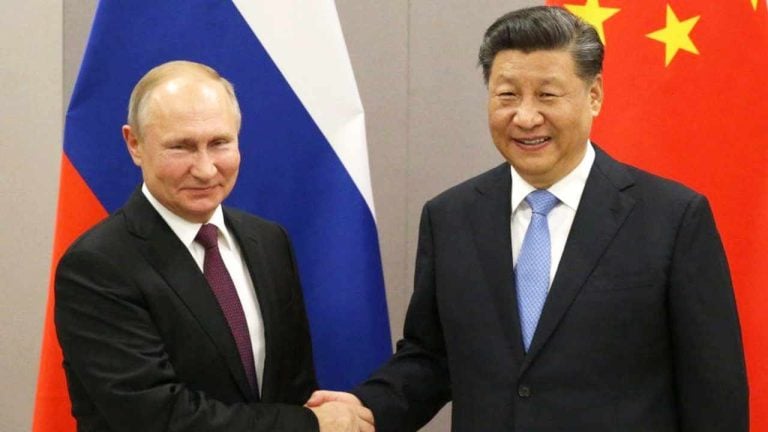Economists Discuss Russia, China Potentially Developing Gold-Backed Currency That Could Undermine US Dollar

Economists have weighed in on reports that China and Russia may be developing a new gold-backed currency that could undermine the U.S. dollar’s status as the world’s primary reserve currency.
Russia and China May Be Developing Gold-Backed Currency
Several experts have shared their views on Russia and China potentially creating a new gold-baked currency, Fox Business reported Saturday, emphasizing that China has been buying up huge quantities of gold while Russia was forced off the U.S. dollar due to sanctions imposed on the country following its invasion of Ukraine.
The news outlet noted that some experts have cautioned that these moves, along with the closer relationship that has developed between Moscow and Beijing, point to the likelihood of China attempting to launch a gold-backed currency. However, neither Russia nor China has officially confirmed plans for such a currency.
Craig Singleton, senior fellow at the Foundation for Defense of Democracies and a former U.S. diplomat, explained that Chinese leaders have talked about reforming the global financial system and reducing the U.S. dollar’s dominance for two decades.
“Two components in that strategy center around the development of a yuan-based global commodities trading system and efforts by China, in partnership with Russia and other like-minded countries, to challenge dollar dominance by creating a new reserve currency,” he told Fox News Digital, elaborating:
In essence, Beijing and Moscow are seeking to build their own sphere of influence and a unit of currency within that sphere, in effect inoculating themselves from the threat of U.S. sanctions.
Swiss exports of gold to China in July rose to their highest level since December 2016. According to Swiss customs data, Switzerland shipped 80.1 tonnes of gold worth 4.4 billion Swiss francs ($4.4 billion) to mainland China during the month.
A research fellow and economist at the Heritage Foundation’s Asian Studies Center, Min-Hua Chiang, believes that the appeal for the new Russia-China currency “will be limited” due to small trade volume, stating:
Even if both countries use a new currency for bilateral trade transactions, the relatively small trade volume will limit the impact on the U.S. dollar.
Data from the Society for Worldwide Interbank Financial Telecommunications (SWIFT), a global financial messaging firm, showed that 42.6% of global payments in August were in U.S. dollars, 34% were in euros, and 2.3% were in Chinese yuan.
The Heritage Foundation economist stressed that the yuan “is still leagues behind the USD and euro,” adding that a multinational currency, like the euro, requires “a level of political and economic coordination and integration that is not present in Asia today.” She opined:
The USD remains the safest, most convenient and most widely used currency in Asia and in the world today. No other currency (backed by gold or otherwise) is comparable, and that is unlikely to change in the near future.
During the BRICS Summit in July, Russian President Vladimir Putin announced that the BRICS economies plan to issue a “new global reserve currency.” The BRICS nations are Russia, China, India, Brazil, and South Africa. Analysts believe the BRICS move to create a reserve currency is an attempt to undermine the U.S. dollar and the International Monetary Fund (IMF)’s Special Drawing Rights (SDRs).
Do you think Russia and China are developing a gold-backed currency that could undermine the U.S. dollar’s status as the world’s reserve currency? Let us know in the comments section below.
from Bitcoin News https://ift.tt/BiPxTYX
Comments
Post a Comment